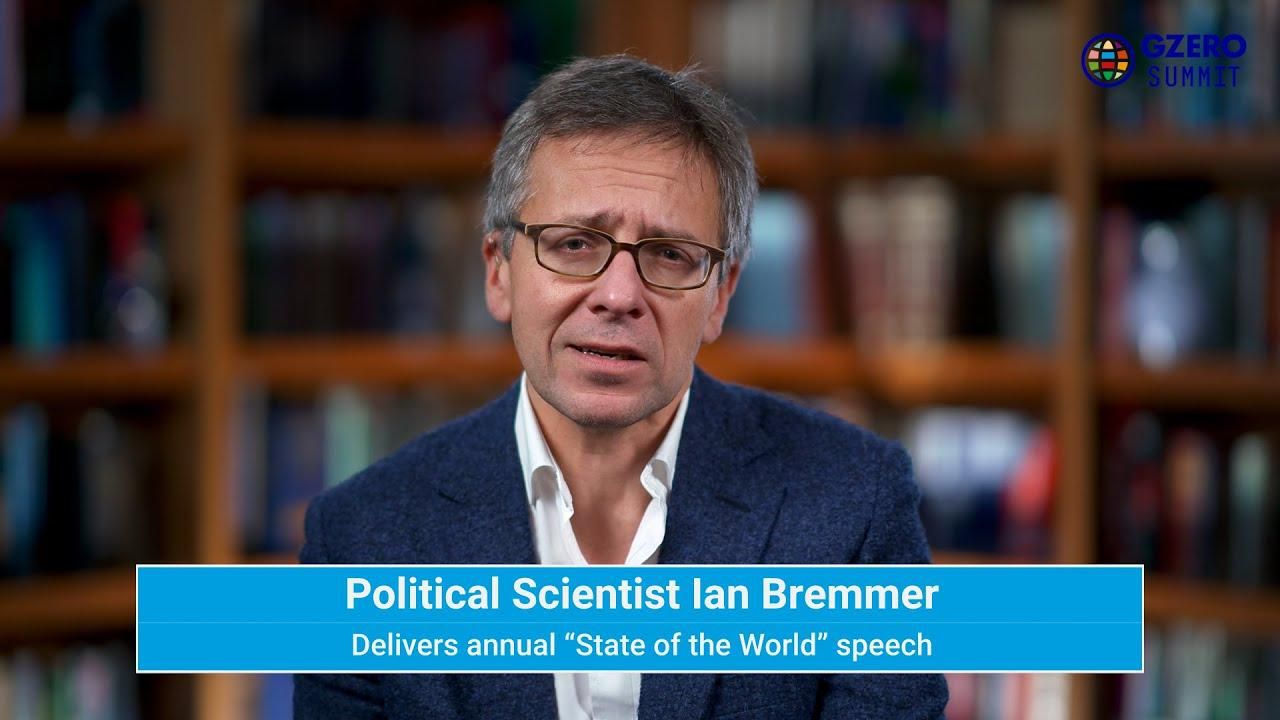State of the World
The next great game: Politicians vs tech companies

State of the World with Ian Bremmer | GZERO Summit | GZERO Media

Ian Bremmer, president of Eurasia Group, our parent company, has opened this year’s GZERO Summit with a provocative speech on the near future of international politics. Here are the highlights.
Are the United States and China now locked in a new form of Cold War? Their governments behave as if they are.
But Bremmer isn’t buying it. He’s not predicting that Washington and Beijing will become more cooperative with one another, but that both will be too preoccupied with historic challenges at home in coming years to wage a full-time international struggle.
In Washington, the main worry will be for America’s broken political system. US politics is becoming even more tribalized as TV and online media target politically like-minded consumers with hyperpartisan news coverage. Widening wealth inequality fuels the fire by separating white and non-white, urban and rural, and the more educated from the less educated. Deepening public mistrust of political institutions will fuel future fights over the legitimacy of US elections.
Beijing’s burden centers on how to extend decades of economic gains while moving away from a growth model that no longer works, as higher wages in China and more automation in factories elsewhere cut deeply into China’s manufacturing advantages. China is still a middle-income country. To reach the prosperity level of wealthy nations, it needs 6-7 percent growth for another 20 years.
But China must spend less in coming years to keep giant, deeply indebted companies afloat and more to care for the largest population of elderly people in history. And its leaders must accomplish this at a time when China’s people expect ever-rising levels of prosperity from their government.
The domestic distraction of US and Chinese leaders will create new opportunities for European, Japanese, Canadian, Indian and other political and business leaders to contribute toward international problem-solving. But other governments aren’t the only new players stepping into this power vacuum.
Technology companies are fast becoming important geopolitical actors. We’re entering a world in which economic winners and losers, election outcomes, and national security will depend on choices made by both governments and by the world’s big tech firms.
Bremmer calls this a “techno-polar moment.”
The idea is simple but transformative: Just as governments make the laws that determine what can happen in the physical world, tech companies have final authority in a digital world that’s becoming both more expansive and more immersive.
The biggest tech companies will establish sovereignty by defining the digital space and its boundaries, the algorithms that determine what happens within that space, and the “terms and conditions” that decide who gets to operate in this world.
For skeptics, Bremmer poses this question: Who will do more to influence the outcome of next year’s US midterm congressional elections: The president of the United States or the CEO of Meta? According to Bremmer, since the vote will be influenced by both real-world rules changes and the online flow of information, the answer isn’t obvious.
How will tech companies try to expand their power? Some will behave as “globalists” by trying to reach consumers and influence politics everywhere.
Others will act as “national champions” by aligning with individual governments and their goals.
Still, others will behave as “techno-utopians,” companies that expect historical forces and tech innovations to help them replace governments in important ways.
The relative success of these models over the next decade will decide how government and tech companies share power over the longer-term and whether democracy or autocracy will have the upper hand.
What’s to be done? “Think adaptation, not surrender,” says Bremmer. Steps can be taken to limit the sometimes negative influence of tech companies in the political lives of democracies. But just as climate change can be limited but not avoided, so we must understand and adapt to a world in which governments and tech companies compete for influence over our lives.
The Supreme Court has struck down President Trump’s use of the national emergency clause to impose sweeping tariffs around the world. In this Quick Take, Ian Bremmer explains why this ruling was predictable and why it’s a major setback for Trump’s trade strategy.
Think you know what's going on around the world? Here's your chance to prove it.
2.5 million: The population of Gabon who can no longer get onto certain social media platforms, like YouTube and TikTok, after the government suspended access on Tuesday.